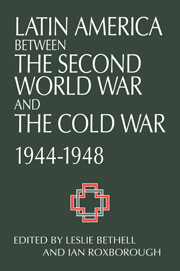Book contents
- Frontmatter
- Contents
- List of contributors
- Preface
- Introduction: The postwar conjuncture in Latin America: democracy, labor, and the Left
- 1 Brazil
- 2 Chile
- 3 Argentina
- 4 Bolivia
- 5 Venezuela
- 6 Peru
- 7 Mexico
- 8 Cuba
- 9 Nicaragua
- 10 Costa Rica
- 11 Guatemala
- Conclusion: The postwar conjuncture in Latin America and its consequences
- Index
9 - Nicaragua
Published online by Cambridge University Press: 04 May 2010
- Frontmatter
- Contents
- List of contributors
- Preface
- Introduction: The postwar conjuncture in Latin America: democracy, labor, and the Left
- 1 Brazil
- 2 Chile
- 3 Argentina
- 4 Bolivia
- 5 Venezuela
- 6 Peru
- 7 Mexico
- 8 Cuba
- 9 Nicaragua
- 10 Costa Rica
- 11 Guatemala
- Conclusion: The postwar conjuncture in Latin America and its consequences
- Index
Summary
The durability of the Somoza regime distinguishes the political experience of Nicaragua from that of other Latin American countries in the middle decades of the twentieth century. But the unusual dynastic quality of the regime should not obscure the similarities between Nicaraguan politics and those of the rest of the continent at certain points. During the period 1944-8, in particular, the relationships between the regime, the opposition, and the labor movement paralleled those of other countries.
Early in 1944 the labor movement in Nicaragua emerged to become, albeit briefly, an important social and political force. And, inspired by the Allied cause, a democratic opposition movement rapidly gathered momentum during the same years as labor's ascent. University students led major protest strikes against the regime in 1944 and 1946. The opposition twice forced Anastasio Somoza Garcia to renounce his candidacy for reelection. Moreover, the opposition and the labor movement succeeded in forcing a measure of democratization in 1946. In November of that year, however, regime repression and growing anticommunism among the political elites pushed the Left and the leftist labor movement into a downward trajectory. The elections of February 1947 were won-fraudulently - by Somoza's presidential candidate, Leonardo Argiiello. And in June Somoza closed off the democratic opening after he engineered a golpe against Argiiello, who had asserted his independence of Somoza and had chosen to work with the opposition and the unions to democratize Nicaragua.
- Type
- Chapter
- Information
- Latin America between the Second World War and the Cold WarCrisis and Containment, 1944–1948, pp. 243 - 279Publisher: Cambridge University PressPrint publication year: 1993
- 1
- Cited by



